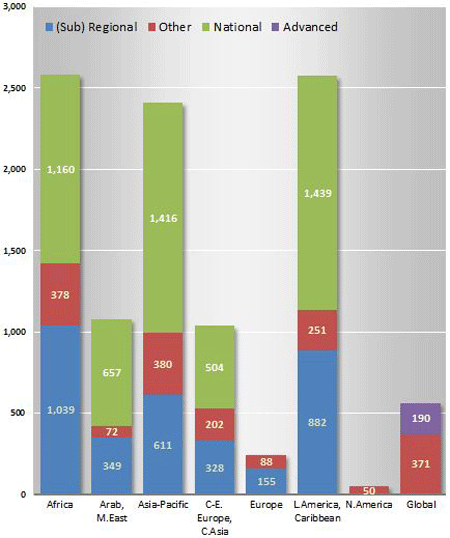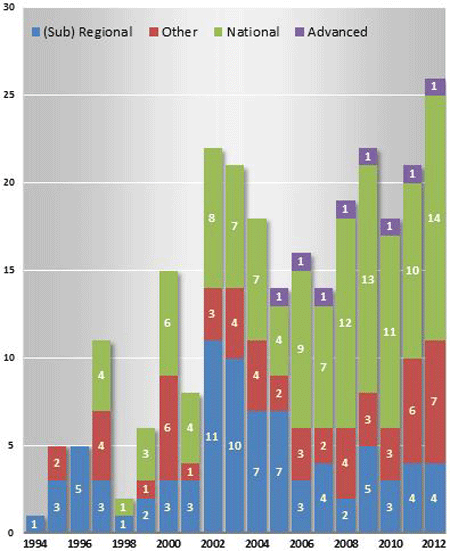NOTE:
THIS NEWS STORY is designed to help the public understand developments in the WTO. While every effort has been made to ensure the contents are accurate, it does not prejudice member governments’ positions.
The official record is in the meeting’s minutes.
MORE:
> sanitary and phytosanitary measures
> SPS news
FIND OUT MORE
about SPS’s “three sisters” — the international
standards-setting bodies:
> Codex Alimentarius
> World Organization for Animal Health
> International Plant Protection Convention
The Sanitary and Phytosanitary (SPS) Measures Committee — which comprises all WTO members and deals with an area having an increasing impact on trade — also continued to struggle to agree on a working definition of private standards.
Progress was reported on consultations on making it easier for countries to use the chairperson’s services to mediate on problems members have about each other’s measures with the aim of avoiding the need to bring legal disputes against each other. This will be discussed again at the next meeting in June.
Members heard about preliminary findings from World Bank research suggesting least developed countries might find their exports constrained as emerging economies set higher standards. And they learnt that the number of officials and others receiving WTO training in SPS issues now exceeds 10,000.
Information and concerns. Five members shared information on latest developments in their countries. The EU reported on horsemeat found in various meat products, which it described as labelling fraud and not a food safety issue. It outlined how the fraud was detected, the measures taken to prevent future fraud, and said the swift and decisive action taken showed the strength of its food safety system.
Japan reported that radiation from the nuclear accident in March 2011 has improved significantly and is well below international guidelines. Exported food is safe but some countries still ban imports or set conditions that are unnecessarily strict, Japan said.
Brazil reported on its single case of mad cow disease (bovine spongiform encephalopathy, BSE), which it said was a rare and spontaneous instance with no identifiable infection from feed or any other source (G/SPS/GEN/1232). Brazil stressed that it was still considered to be a negligible risk for BSE and asked countries to remove all restrictions on its exports due to that BSE case.
Australia and the US reported on changes to their SPS regimes.
On specific issues, the committee discussed four new concerns, 11 that had previously been raised, and two measures members have notified to the WTO.
These covered: materials added to plastics in food and drink containers; various fruits; pine and other confer trees; seed potatoes; shrimps; tequila; pesticides; salmon; “novel foods”; import restrictions caused by port closure; sesame; offal; residues of a veterinary medicine; and seeds treated with substances that could endanger bees. (Some details below.)
Some details
The WTO’s World Trade Report 2012 has identified SPS measures among non-tariff barriers that are having an increasing impact on trade.
The SPS Committee’s main task is to monitor how countries are implementing food safety and animal and plant health measures under the WTO Agreement, and to discuss issues arising from that, including the work of recognized international standards-setting bodies. Its deliberations range from comments on specific measures to broader principles.
Specific trade concerns
(Full list in “PS“ below)
The concerns arousing the most comment were:
Indonesia’s port closure (see earlier news story and specific trade concern 330 in spsims.wto.org) for fruit and vegetables, raised this time by China, which also complained about various import licensing conditions, including certification by a private surveying company at the port of export. Support came this time from the EU, Rep. Korea, Chile, Argentina, Chinese Taipei and Uruguay.
Indonesia, which has said Jakarta Port was closed to horticultural imports because it lacked inspection and quarantine facilities, repeated that three other ports are available and urged members to contact the government to receive advice on how best to use the latest regulations.
Japan’s maximum residue levels applied to sesame. (see spsims.wto.org specific trade concern 321). Paraguay — supported by Indonesia, Mexico, Ecuador, India and Argentina — complained that the 0.01 parts per million (ppm) pesticide limit for sesame is unjustified, and inconsistent with the 0.05ppm set for other products.
Japan said it is still waiting for scientific data from exporting countries in order to review the limit. Paraguay countered that it is up to Japan to provide the scientific evidence to support the limit and India said limits should not be set arbitrarily.
Private sector standards
Chairperson Maria Albarece of the Philippines reported that consultations before the meeting looked at proposed definitions for private sector standards, the first of five agreed actions, which would define the scope of the deliberations on these standards.
She said the discussions of compromise definitions were constructive but no consensus has emerged and she invited members to submit written proposals, which would be discussed at the next meeting in June.
Belize — supported by Brazil, Ecuador, Dominican Rep, El Salvador, Cuba, Argentina, Uruguay and Chile — complained about the lack of progress and what it described as some members’ objection to “interfere with market requirements”.
Leaving these requirements to the private sector would mean member governments are delegating their responsibility under the SPS Agreement, to ensure SPS measures do not restrict trade unnecessarily, Belize said.
The EU said it recognizes the interest in the subject, but believes private standards should be handled in other forums. However, members have agreed to a work programme and the first topic, the definition, is needed in order to set the parameters for the discussion, the EU said.
Background. Since the SPS Agreement mainly deals with government measures, some members doubt whether the committee can act on private sector standards. The agreement’s Art.13 includes this sentence: “Members shall take such reasonable measures as may be available to them to ensure that non-governmental entities within their territories, as well as regional bodies in which relevant entities within their territories are members, comply with the relevant provisions of this Agreement.” It does not say how this should be done.
When first raised in 2005, this issue took the SPS Committee into comparatively new territory — the committee generally deals with standards set by international standards-setting bodies and those imposed by governments.
A number of developing countries in particular are concerned that private standards — which apply for example in supermarket chains — could undermine the disciplines negotiated in the SPS Agreement. Some delegations also argue that by meeting private standards, exporters can improve their products’ marketability.
BRICs’ standards and least developed countries
The finding that least developed countries’ exports are being constrained by emerging economies’ higher standards is in a World Bank paper circulated for the meeting (G/SPS/GEN/1228).
The Bank said it has started to examine the impact of SPS standards on low income countries using a newly constructed Standards Restrictiveness Database.
“Broadly, the question we seek to answer through this research is: What is the impact of standards (particularly ‘maximum residue levels’ (MRLs) of pesticides) on agricultural exports of developing countries?” the paper says.
The first study on the subject focuses on the impact of standards among the BRICs (Brazil, India and China) on least developed countries’ agricultural exports.
“Thus far we find that indeed, more standards leads to fewer imports overall,” the paper says. “These initial results suggest, as hypothesized, that LDCs [least developed countries] risk losing out as incomes in BRICs increase and standards restrictiveness follows suit.”
But the World Bank adds that this is still work in progress.
10,522 officials trained in SPS
Training, mainly for government officials, and mainly from developing countries and former centrally planned economies, is an important part of the WTO’ work. SPS is an area where the need is particularly great because of the complex technical issues involved and the direct impact on trade.
Between September 1994 — three months before the WTO officially came into being — and December 2012, a total of 10,522 people received SPS training at various levels, in 268 training events, the Secretariat told the meeting. Details are in document G/SPS/GEN/521/Rev.8.
Participants in WTO SPS training
September 1994–December 2012

Numbers of WTO SPS training activities
September 1994–December 2012

Chairperson: Ms Maria Albarece of the Philippines
Next meetings
These dates (with informal meetings on other days in the week) could still be changed:
2013
- week of 24 June
- week of 14 October
P.S.
These are some of the trade issues or concerns discussed or information supplied by members.
Information from members
- Japan — current status after the nuclear power plant accident
- European Union — fraud related to labelling: non-labelled horse meat in meat products
- Australia — retiring the Australian quarantine and inspection service (AQIS) brand
- United States — update on FDA food safety modernization act (FSMA) (US presentation in pdf format)
- Brazil — bovine spongiform encephalopathy (BSE) case in Brazil — final report
Specific trade concerns
(Document G/SPS/GEN/204/REV.13)
New issues
- China’s import conditions related to phthalates — concerns of the European Union
- France’s ban on bisphenol a (BPA) — concerns of the united states
- India’s import restrictions on apples, pears and citrus — concerns of Argentina
- EU limitations on imports of certain products subject to quarantine — concerns of RUSSIA
Issues previously raised
(Numbers are “specific trade concerns” numbers in the database http://spsims.wto.org)
- Turkey’s requirements for importation of sheepmeat — concerns of Australia (no. 340)
- Import restrictions due to BSE — concerns of the European Union (no. 193)
- Brazil’s measures on shrimp — concerns of Ecuador (no. 344)
- China’s standard for distilled spirits and integrated alcoholic beverages (G/SPS/N/CHN/377) — concerns of Mexico (no. 278)
- EU maximum residue levels of pesticides — concerns of India (no. 306)
- China’s quarantine and testing procedures for salmon — concerns of Norway (no. 319)
- Application and modification of the eu regulation on novel foods — concerns of Peru (no. 238) (G/SPS/GEN/1218)
- Indonesia’s port closure (G/SPS/N/IDN/53, G/SPS/N/IDN/54 and G/SPS/N/IDN/54/corr.1) — concerns of china (no. 330)
- Japan’s maximum residue levels applied to sesame — concerns of Paraguay (no. 321) (G/SPS/GEN/1220)
- Viet Nam’s ban on offals — concerns of the European Union and the United States (no. 314)
- Japan’s restrictions on shrimp due to anti-oxidant residues — concerns of India (no. 342)
Consideration of specific notifications received
- Costa Rica, veterinary drugs residues in meat and meat products (G/SPS/N/CRI/136) — questions from Panama
- EU, plant protection products and treated seeds containing clothianidin, thiamethoxam and imidacloprid (G/SPS/N/EU/39) — concerns of the US
Information on resolution of issues
- (none)
This meeting’s magic number
10,522
— officials from developing countries and former centrally planned economies receiving WTO SPS training, September 1994–December2012, in 268 training sessions. Document G/SPS/GEN/521/Rev.8 .
Place the cursor over a term to see its definition:
• sanitary and phytosanitary measures
• S&D, STD, special and differential treatment
> More jargon: glossary
> Problems viewing this page?
Please contact [email protected] giving details of the operating system and web browser you are using.
